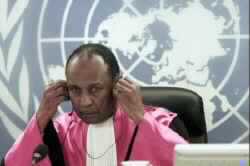ARUSHA, Tanzania (AP) - The trial of four former Rwandan army officials charged with masterminding the 1994 massacre of more than 500,000 people opened Tuesday with U.N. prosecutors accusing them of unleashing "a legion of ferocious demons" on the victims.
Col. Theoneste Bagosora faces 12 counts of genocide, crimes against humanity and rape for his role as the army chief of staff. He and co-defendants Lt. Col. Anatole Nsengiyumva, Maj. Aloys Ntabakuze and Brig. Gen. Gratien Kabiligi have all pleaded innocent. Nsengiyumva is charged with 11 counts and Ntabakuze and Kabiligi with 10 counts each.
Rwandan and tribunal officials hope the trial will reveal the military's complicity in the genocide, as well as the planning behind the 100-day slaughter in Rwanda in which more than 500,000 Tutsi civilians and politically moderate Hutus were killed.
All four men boycotted the trial's opening day, claiming their rights had been violated by prosecutors who have not supplied them with French translations of key prosecution documents. They also complained that they were not given the names and testimony of protected witnesses 60 days before trial. The court had earlier reduced that requirement to 35 days, for this trial only, a decision defense attorneys appealed.
The court ruled Tuesday that prosecutors could proceed with an opening statement, but that witnesses could not testify until documents related to them were translated.
The prosecution alleges that Bagosora took direct control of the army following the shooting down of a plane carrying President Juvenal Habyarimana on April 6, 1994. The genocide erupted after the plane was downed.
Emmanuel Ndahiro, Rwandan President Paul Kagame's security adviser, told AP that Bagosora was "essentially the de facto leader" of the government during the genocide.
Bagosora, 60, is alleged to have walked out of peace talks with the Tutsi-led rebels in Tanzania in 1993, saying he was returning to Rwanda to "prepare for the apocalypse." He and the other officers on trial are also alleged to have trained and armed a Hutu militia, known as the "Interahamwe," at the forefront of the slaughter.
The genocide is believed to have been planned well in advance by Hutu-extremist members of the army and government.
The genocide ended when Tutsi rebels, led by Kagame, captured Kigali, the capital, in July 1994 and formed a government of national unity.
The trial was adjourned until Wednesday, when a closed-door "status conference" will be held.
PHOTO CAPTION:
Judge Lloyd Williams of the International Criminal Tribunal for Rwanda adjust his headphones, Tuesday April 2, 2002 during the opening session of the trial against Col. Theoneste Bagosora accused of being the mastermind of the 1994 Rwandan genocide and his co-defendants Lt. Col. Anatole Nsengiyumva, Maj. Aloys Ntabakuze, and Brig. Gen. Gratien Kabiligi in Arusha, Tanzania. The four accused refused to attend the opening of their trial. (AP Photo/Karel Prinsloo)
- Author:
AP - Section:
WORLD HEADLINES


 Home
Home Discover Islam
Discover Islam Quran Recitations
Quran Recitations Lectures
Lectures
 Fatwa
Fatwa Articles
Articles Fiqh
Fiqh E-Books
E-Books Boys & Girls
Boys & Girls  Ramadan
Ramadan Fatwa Audios
Fatwa Audios Month of Mercy
Month of Mercy Women
Women Eed Al- Fitr
Eed Al- Fitr Food Recipes
Food Recipes Videos
Videos

 Prayer Times
Prayer Times












